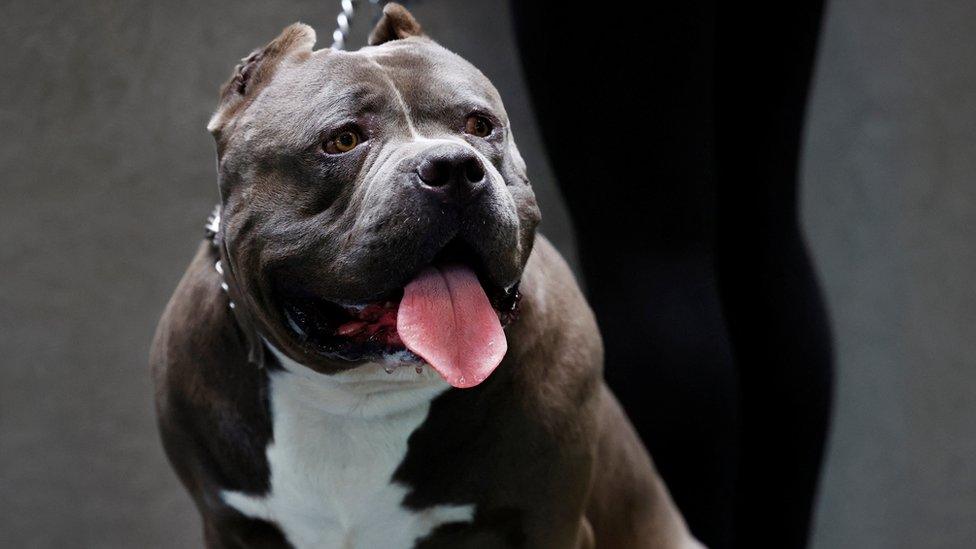American bully XL owners can register dogs for exemptions in England and Wales
- Published
- comments

American bullies have been involved in several high-profile attacks
Owners of American bully XLs can apply to register their dogs for an exemption before the breed is banned next year.
It will be illegal to own a bully XL in England and Wales from 1 February.
Owners who wish to keep their dogs must apply to the exemption scheme, external or they can choose to have their dog euthanised and apply for compensation.
It follows a number of attacks involving the breed, although owners insist the dogs, despite their appearance, make lovable pets.
From 31 December 2023 it will be against the law to sell, abandon, breed from or give away an American bully XL, or have one in public without a lead or muzzle.
Dogs on the exempt list will also have to be neutered and microchipped.
Those more than a year old on 31 January must be neutered by 30 June, while those under 12 months old must be neutered by 31 December 2024.
There is a £92.40 application fee, to cover administration costs, for owners to register their pet on the Index of Exempted Dogs.
Owners without a certificate of exemption will face an unlimited fine if they are found to be in possession of a bully XL after the ban comes into force and their dog could be seized.
Christine Middlemiss, the UK's chief veterinary officer, said: "The transition period for XL bully dogs has now started. It is important that XL bully owners read the guidance and take all the necessary steps.
"This includes applying for a certificate of exemption if you want to keep your dog and ensuring they are muzzle trained by the end of the year, as your dog will need to be muzzled and on a lead in public after 31 December 2023.
"XL breeders should have also now stopped breeding their dogs and I would advise all owners to make an appointment with your vet to get your XL bully neutered as soon as possible."
The guidance is similar to that issued for the four breeds which were banned under the Dangerous Dogs Act 1991: pit bull terriers, Japanese Tosas, Dogo Argentinos and Fila Brasileiros.
The Department for Environment, Food and Rural Affairs has published details defining an American Bully XL, external, which is not a breed recognised by the Kennel Club in the UK.
According to this, the dogs are a "large dog with a muscular body and blocky head, suggesting great strength and power for its size. Powerfully built individual".
Prime Minister Rishi Sunak announced the breed would be banned following a series of incidents.
These included the death of a man after a suspected attack by an American bully XL in Walsall on 14 September. Days earlier, an 11-year-old girl, along with two men, were attacked by an American bully XL in Bordesley Green, Birmingham.
In 2021, 10-year-old Jack Lis died from severe neck and head injuries after he was attacked by an American bully XL in Caerphilly. His mother, Emma Whitfield, has been calling for the dogs to be banned.
The new guidance does not apply to Northern Ireland or Scotland.
Both currently ban the pit bull terrier, Japanese tosa, Dogo Argentino and Fila Braziliero.
If Scottish ministers agree, then the ban will be applied in Scotland.
In Northern Ireland a ban on an American bully XL would require a separate change to legislation, either by a sitting Assembly and Executive or through an intervention by the Northern Ireland secretary.
The current exemption scheme for banned breeds allows for an exemption if a court is satisfied that the dogs do not pose a danger to the public and their owners are deemed to be fit and proper people to own a dog of that type.
There are almost 3,500 banned dogs living legally at home with their owners in England, Scotland and Wales under the scheme, according to data released from the government to the BBC.
Many animal charities have opposed a ban.
The Dog Control Coalition - which includes Battersea, Blue Cross, the Dogs Trust, BVA, the Scottish SPCA, the Kennel Club and Hope Rescue - told the BBC that breed-specific bans had been proven to be ineffective.
It says the problem lies with owners.